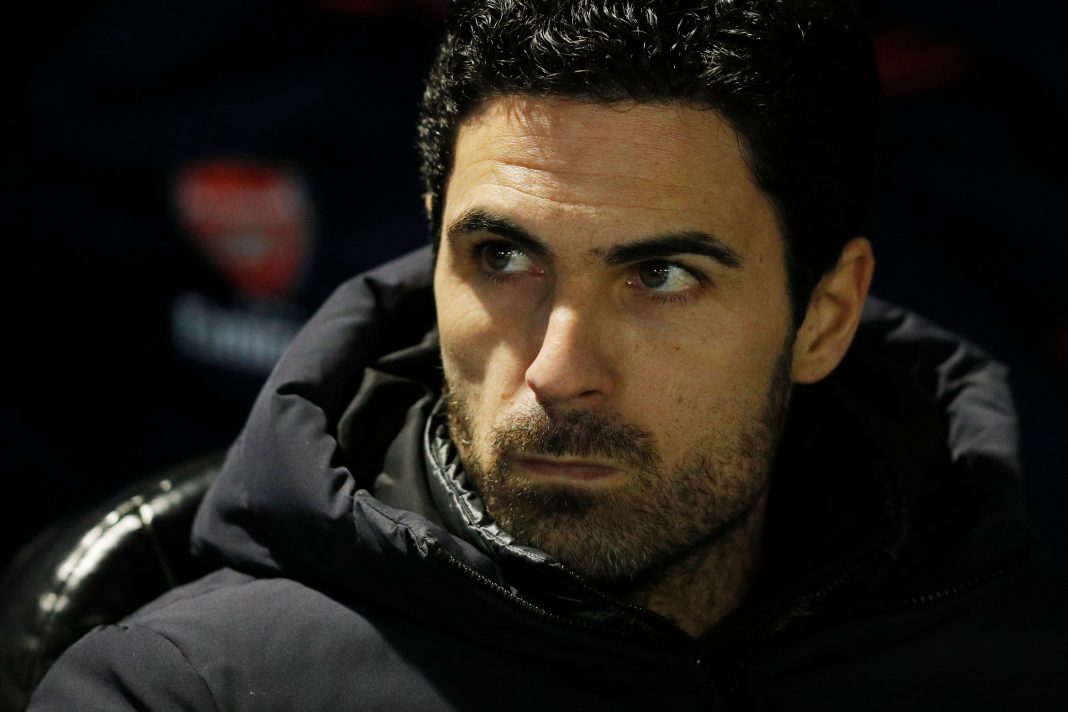Despite now sitting on the Arsenal bench as head coach, Mikel Arteta’s career as one of Arsenal’s unsung playing heroes should never be forgotten.
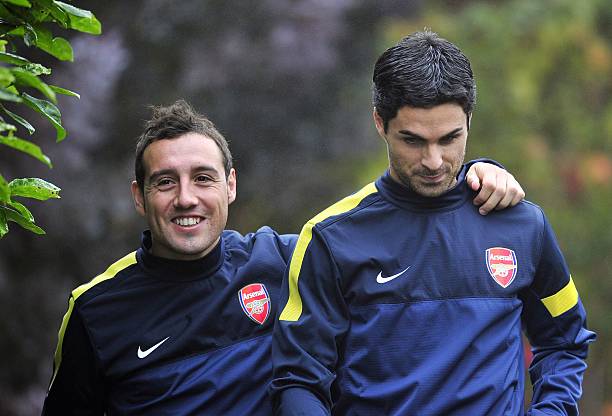
In the beginning
Born in Basque Country, Arteta started his football career at Antiguoko in 1991.
The Spaniard was just nine at the time and found himself befriending his fellow player, Xabi Alonso. Both youngsters dreamed of playing for Real Sociedad and while Xabi went on to accomplish his this, Arteta signed for Barcelona’s academy in 1997.
The midfielder failed to break into Barca’s first team despite making 42 appearances for their second side and was even sent out on loan to Paris Saint-Germain in 2001.
He made 31 appearances and scored twice during his season in France. However, once his loan spell was up, despite PSG apparently having a ‘buy first’ option in their agreement and wanting to keep him, the Catalan giants decide to sell and in March 2002.
Arteta signed for Rangers for £6m.
He was still just 20 years old.
During his two years in Scotland, Arteta became a fan favourite, making 50 appearances and scoring 12 goals, including one in the Old Firm derby. The late penalty on his derby debut sent Rangers top of the league on goal difference and resulted in them winning the Treble.
No wonder the fans loved him…
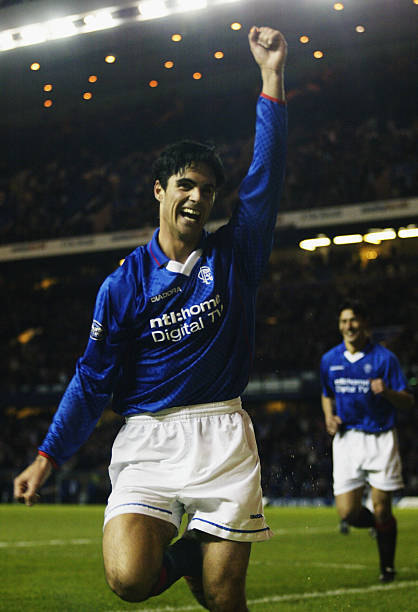
Back to Spain
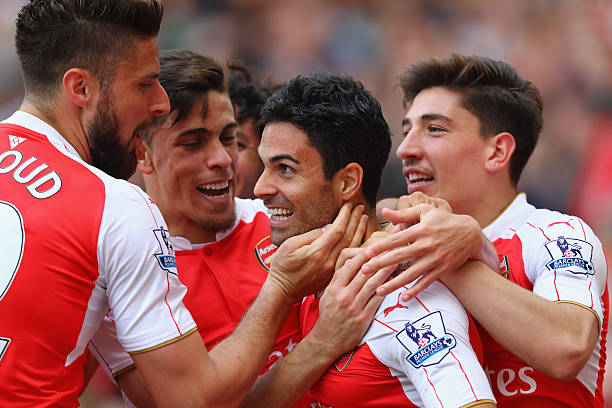
In 2004, Arteta fulfilled his dream as he joined his mate Xabi at Real Sociedad in a €5.2m move. Unfortunately, however, it wasn’t mean to be. The midfielder only made three league starts in half a season and he was eventually sent out on loan to Everton.
Xabi, meanwhile, signed for the Toffees’ rivals, Liverpool, in August 2004.
Everton was where Arteta really learned his trade.
After spending half a season on loan with the Blues, Sociedad sold him for £2m in 2005. Little did the Toffees know, they’d just signed a gem of a player.
During Arteta’s time under David Moyes, he really got to explore his versatility.
He was primarily a central midfielder but had been known to play on either wing. In fact, in 2011, towards the end of his time with the Toffees, he spent a few months as a left midfielder.
This gave the Spaniard a wonderful understanding of how to move the ball, awareness of his teammates and helped hone his creativity when it came to passing. It also made him an asset when pressing forward.
Arteta spent six years at Everton and made over 200 appearances.
He also scored 35 goals and assisted 33. However, he never had a shot at being captain.
He spent 371 days out through injury but 332 of these were down to a cruciate ligament rupture he suffered in February 2009 and from then on he stayed fit. Therefore, it probably had more to do with him being in a team with Phil Neville. The England international was always going to get the arm band.
Arteta did, however, get the #10 shirt.
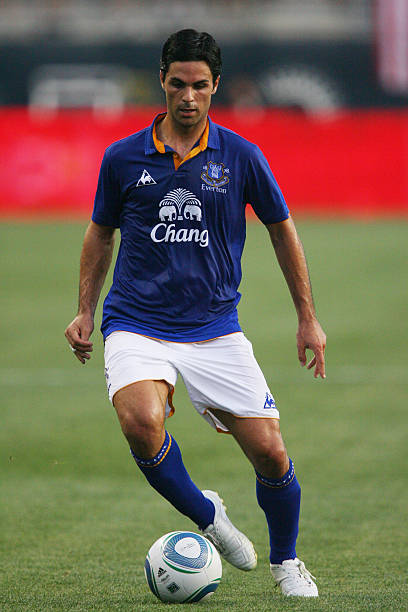
London calling

After six years at Everton, Arteta got the chance of a lifetime.
At the end of August 2011, Arsenal were just above the relegation zone after drawing against Newcastle, losing 2-0 at home to Liverpool and getting thumped 8-2 at Old Trafford.
The transfer window was closing and Wenger needed to act. Arsenal were in a bad place.
When news that Arsenal could be signing Arteta from Everton filtered onto social media, most fans were excited. We understood that we needed a secure midfielder who was professional and experienced enough to come in and help the team overturn what had been a disastrous start to the campaign.
The Gunners had been interested in the Spaniard for a while but finally made a move on 31 August and despite the deal being on and off throughout the evening, they finally got it wrapped up before the deadline.
With that, Arteta had joined Arsenal for £10m.
Arteta made his debut for the Gunners on 10 September against Swansea, which Arsenal won 1-0 and he scored his first goal a week later during his side’s 4-2 defeat to Blackburn Rovers.
He went on to make 150 appearances for Arsenal in all competitions over the five years he was in north London. He scored 16 goals, including the winner against Manchester City at the Emirates in April 2012. Fine, we only closed the gap between third and second to 10 points but it was a good win!
Arteta first captained Arsenal in September 2012 in the FA Cup against Leeds – the very same match Thierry Henry came on as a late sub and netted the winner.
However, he didn’t become skipper of the Premier League team until the following year. From then on, there was no looking back when it came to the armband. There was no one else fit for the job.
A true leader
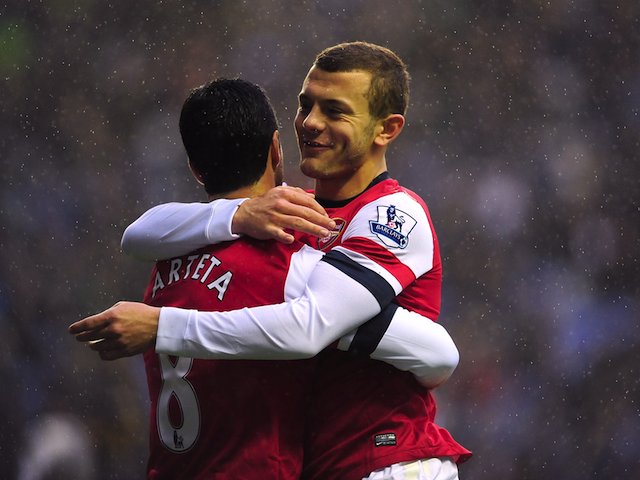
Arteta’s injury woes prevented him from being the true leader we needed. It’s hard to lead a band of men who are all looking up to you, when you’re just trying to reassure yourself that you can recover.
You also have to consider the bizarre era Arsenal Football Club were in in general.
Robin van Persie, Cesc Fabregas and Samir Nasri all left, no one appeared to have any faith in the club, let alone the manager, and there was a weird atmosphere surrounding the squad.
For example, at this stage, we were still playing pretty, Wengerball. However, we weren’t prolific in front of goal, especially after van Persie went running off to United, and we made horrific, funny-if-I-wasn’t-a-Gooner mistakes at the back constantly.
We became the laughing stock of the Premier League.
With so much uncertainty surrounding the club, I imagine it must have been exceedingly difficult for Arteta to run a tight ship.
No one knew who was staying and who was going or whether we’d be in the Champions League from one season to the next.
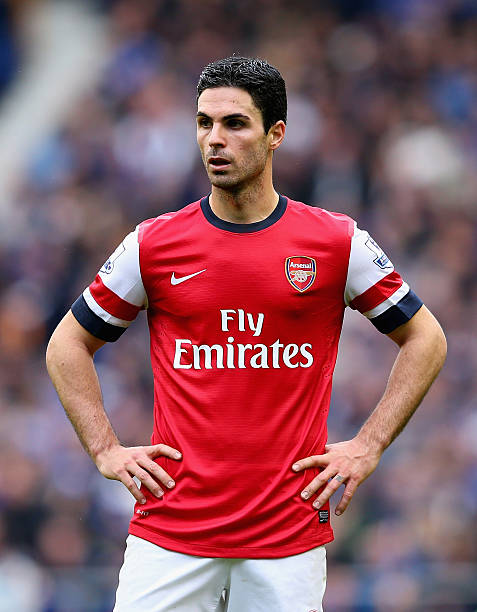
The midfielder’s calf caused him a lot of problems during his time in north London.
In fact, he spent 343 days sidelined, which was hugely frustrating. He’d pushed for a move to a club he admired to work under a manager he respected deeply and he barely managed to get off the treatment table.
Stateriffic
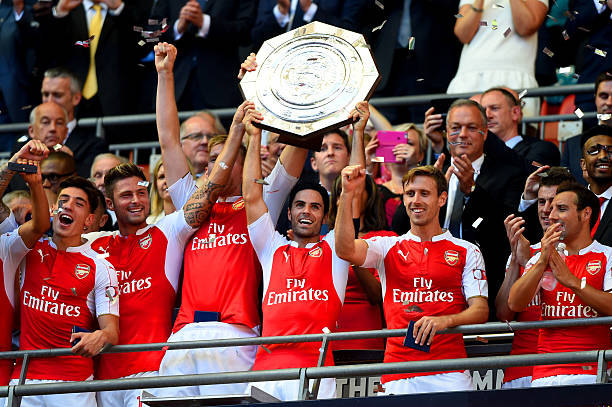
During his time in north London, Arteta racked up some impressive stats, which no one really talks about because the only ones people seem to care about are goals and assists.
From 2012/13 to when he left in 2015/16, Arteta averaged 91.25% pass completion. If anything, this is slightly lower than it should be because he only averaged 88% over his nine appearances during his final season. He also only made seven the term before due to injury and completed 94%.
The vast majority of Arteta’s passes were forward – two thirds to be exact. In total, 3,537 of his total passes for Arsenal were forward compared to 1,678 back.
In other words, 68%.
What’s more, his distribution from deep was instrumental to Arsenal’s attack. Especially when we were looking stagnant, which is what happened with Mathieu Flamini on the pitch.
Arteta couldn’t pick out the type of pass Mesut Ozil delivers, but that wasn’t his job. His job was to keep the ball moving in the right direction, which sounds simple until you watched Francis Coquelin try to do it.
He was the embodiment of a deep-lying playmaker in a way very few players are.
Not only this but he could challenge well. He wasn’t a liability despite lacking strength compared to someone like Yaya Toure at the time. He always knew exactly what to do and did it with a level head, while also exhibiting passion for the team.
When there was a fight, Arteta was the man to stand at the front but also know when to pull his men away if it got too feisty.
Arteta was key to keeping the players’ heads up and not just on the pitch but off it too.
The Spaniard was a versatile central midfielder that could contribute to the defensive and offensive sides to the game well, without complaining about position.
I remember hearing a story about how, when Arteta and Per Mertesacker arrived, they made everyone eat lunch together instead of in their cliques. It was a ballsy move to come into a new club and start ordering players around but it he obviously earned their respect because he later became their captain.
Unfortunately, Arteta’s exploits never translated onto the international stage. The midfielder was never called up to represent Spain, despite playing for their u16s, u17s, u18s and u21s.
However, this was purely down to competition in a world class squad.
Arteta had the likes of Xavi, Andrés Iniesta, David Silva, Fabregas, Juan Mata and Thiago Alcântara ahead of him. Most of whom were far less-injury prone and, let’s face it, more skilled then him.
Moving on
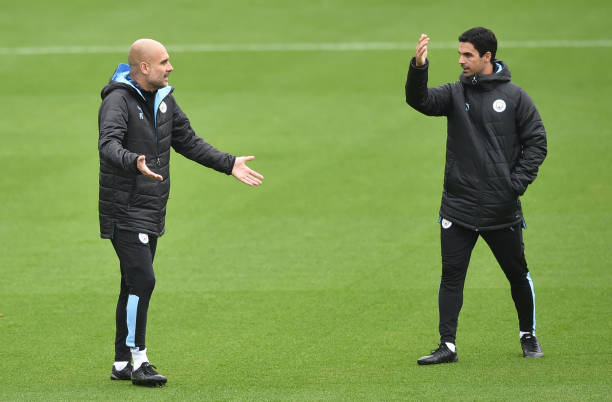
In 2016, it was announced that Arteta would become Manchester City’s assistant coach alongside fellow Spaniard, and friend, Pep Guardiola.
The midfielder’s contract was set to run out at the end of the season and although Arsenal allegedly offered him a job coaching with the academy, it’s fairly easy to work out why he politely turned it down in favour of a move up north.
“I’ve enjoyed an amazing five years at Arsenal and it’s been an honour and a privilege to captain such a great club,” said Arteta. “I am now looking forward to the challenge ahead at Manchester City. The opportunity to join Pep Guardiola and his team was an amazing opportunity for me.”
He continued, “I would like to personally thank the manager, board, all of my teammates and of course the fans for the fantastic support I’ve received during my time there.”
Arteta’s ‘goodbye’ statement, shared via his personal Twitter account, encapsulated everything he had been as a player and reminded us all why signing for Arsenal all those years ago had been a no-brainer. He was classy, humble, and a special bloke.
An unsung hero.
Arteta’s class was demonstrated once again when Manchester City, his new club, beat Arsenal 2-1 at the Etihad in their first meeting with him on the opposing bench. As his team went 2-1 ahead against an Arsenal side that had so far been really strong in the league, the Spaniard sat on the bench, stoic and calm, refusing to jump around with his colleagues.
While I do find it odd when former players don’t celebrate against their old teams, I appreciate what it must take not to. Objectively, a side he’d only joined and was helping to coach, just overcame their title rivals.
Although the scoreline was only 2-1 that time, City played the Gunners off the pitch and that must have felt good. If it had been any other team, I have no doubt Arteta would have celebrated.
Against Wenger’s men, he didn’t.
Manager in waiting?
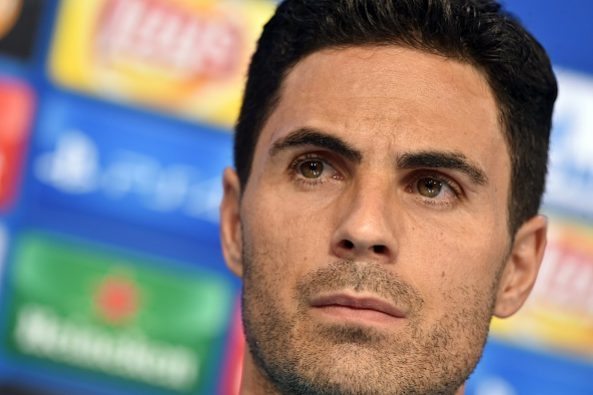
After finishing third in the Premier League table two seasons ago, City have gone from strength-to-strength. Their 2018 title win was one of the most impressive in the Premier League era and they had to better that to win it in 2019.
Many people credit Pep Guardiola with their rapid rise, as he’s the manager and has put together a great squad. Some obviously credit the massive amount of money that the Spaniard spent on the squad.
Interestingly, however, Pep has praised his right-hand man, Mikel Arteta, particularly when it comes to Sterling’s progress over the last few seasons.
“I think he is enjoying scoring goals, he’s not scared,” said Guardiola of Sterling. “Now he realises, wow, how fun and good it is to score goals. Now he is more focused on that.
“Mikel Arteta is working many, many days after training sessions for the last action, for the control in the last moment. For his improvement, [Sterling] wants to stay there and shoot and improve with the goalkeepers.
“He knows the striker has to score goals if you want to achieve the next step. You will not survive in the high-level teams as a striker or a winger if you don’t score goals.
“All the strikers and wingers have seven goals or more, it’s not just Gabriel [Jesus]and Sergio [Aguero]. That is so important for us.”
He’s still a low-key hero, even after hanging up his boots, it seems.
It was always logical to speculate that Arteta wanted to become a manager one day.
He’s already taken the first step by becoming an assistant under Pep Guardiola and former striker Tony Cascarino wrote in his column for the Times that the Spaniard should be Arsene Wenger’s successor when the Frenchman’s contract expires in 2019. That was before Wenger quit and Arteta’s name was indeed linked with the job.
Mauricio Pochettino, whom Arteta was with at PSG, also speaks very highly of the ex-midfielder and Wenger has hailed the Spaniard’s leadership skills more than once.
In October 2015 he said, “Mikel has a huge influence even when he is not playing. He is super conscientious, and every morning two hours before training he prepares and that is absolutely right.
“Just through his behaviour, his focus on getting everything right in the team, he has a huge influence. He has great experience and is respected throughout the squad.
“I really hope Mikel considers going into coaching. When you manage, you want to see your players continue and see them give their experience and knowledge back.
“You want them to give their expertise of the way we want to play football and the way we want to behave. It would be great if someone like Mikel went into management, so somewhere the spirit of our game can survive through the players who have played for us.”
In May 2016, as Arteta was still earning his coaching badges, he led a session on passing at the FA Wales Coaches Conference, which seemed to go somewhat under the radar at the time but now makes a lot of sense. Classic, low-key Arteta was secretly trying to take over the world of coaching, one step at a time.
Now he’s at Arsenal and things have already vastly improved compared how they were under Unai Emery.
If football ever returns, who knows what else he’ll manage to get up to.

